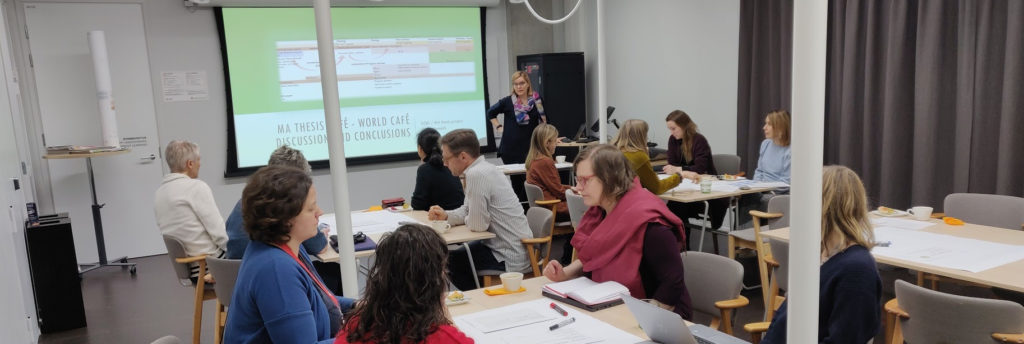In this guest post, the team of the project MA Thesis Journey reflect on their own journey with this project so far. MA Thesis Journey is part of one of our Aalto Online Learning pilots.
Motivation of the students
The Master’s thesis is experienced by students as the culmination of their studies. Worth 30 of the 120 ECTS credits needed to graduate, it’s a major part of their degree workload and grade point average. Aalto’s Department of Design has five programs in design with an annual cohort averaging 135 students, including an intake of 70 students. A further 45-60 students are continuing directly from Bachelor’s studies, and additional students on exchange or through our Tongji University cooperation.
Students from these varied backgrounds pursue Master’s theses with an array of methods, in wide-ranging subjects, and with different types and amounts of guidance. This diversity can make it difficult to scope the thesis topic, plan the workload, navigate the process and know when to stop.
For many, the Master’s thesis is their first or biggest individual and academic endeavor, and especially when employment opportunities beckon, it can be challenging to stay on the course.
At the same time, on-time graduation of students is prioritized as a ‘key performance indicator’ under the renewed policy of Finland’s Ministry of Education and Culture. The volume and the timeliness of student completion thus directly affect governmental funding granted to the university. In the Department of Design, we have identified the master’s thesis as one of the main challenges to on-time graduation.
Objective of the project
Our aim in the project ‘MA Thesis Journey’ is to improve the educational framework and student experience of Master’s thesis work. This departmental project is part of a larger, coordinated effort within the School of Arts, Design and Architecture, including a revised ‘MA Thesis Guide’. At the same time, organizational changes within university Learning Services entail how to integrate pedagogical experts and program coordinators.
The project builds on previous pilots, best practices and tools benchmarked from departmental ‘joint studies’, from within the department’s five Master’s programs and from other departments across the university. Having identified existing and potential online elements (e.g. information and teaching materials for students, synchronized and networked tools for staff), we initiated an Aalto Online Learning project within the larger project.
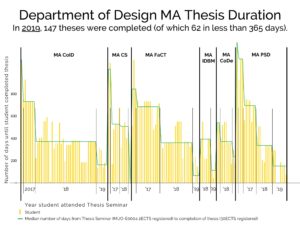 |
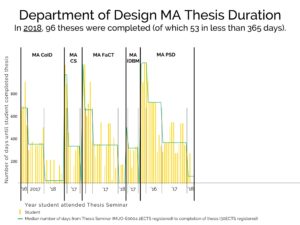 |
Figure 1. MA thesis duration historically (2019 and 2018) within the Department of Design (programs include: CoID Collaborative and Industrial Design; CS – Creative Sustainability; FaCT – Fashion, Clothing and Textile Design; IDBM International Design Business Management; CoDE – Contemporary Design, and; PSD Product and Spatial Design). While there are many variables likely affecting such statistics (e.g. the introduction of tuition fees for non-EU/EEA students and the PSD program closure), profound challenges revealed in these charts and our Program Review generally motivated the launch of the ‘MA Thesis Journey’ project. (click to enlarge graphs)
‘MA Thesis Journey’ so far
Phase 2 is now underway. Phase 1 included several work-packages reviewing the current situation: including thesis-related courses; supervisor, advisor and examiner roles and policies; presentation and finalization procedures, and; a support framework for thesis work in terms of three distinct stages (see Figure 2). Phase 2 analyzes and operationalizes findings and benchmarks in terms of policies, guidelines, terminologies, procedures and tools for students, faculty and administrators. Milestones include a ‘Thesis Kickoff’ in May within the ‘Design Research’ course for first-year Master’s students and launch of the online ‘Thesis Portal’ in August as second-years start to make their thesis plans.
The project has involved diverse stakeholders in various expert and collaboration roles. Work-packages include departmental faculty and Learning Services experts. Program heads, coordinators and delegates participate in key activities, including a ‘Learning Café’ (see Figure 3), faculty discussions take place in department meetings, and the Head of Department is engaged throughout. Through questionnaires and the departmental student associations, student learnings and ideas are also included.
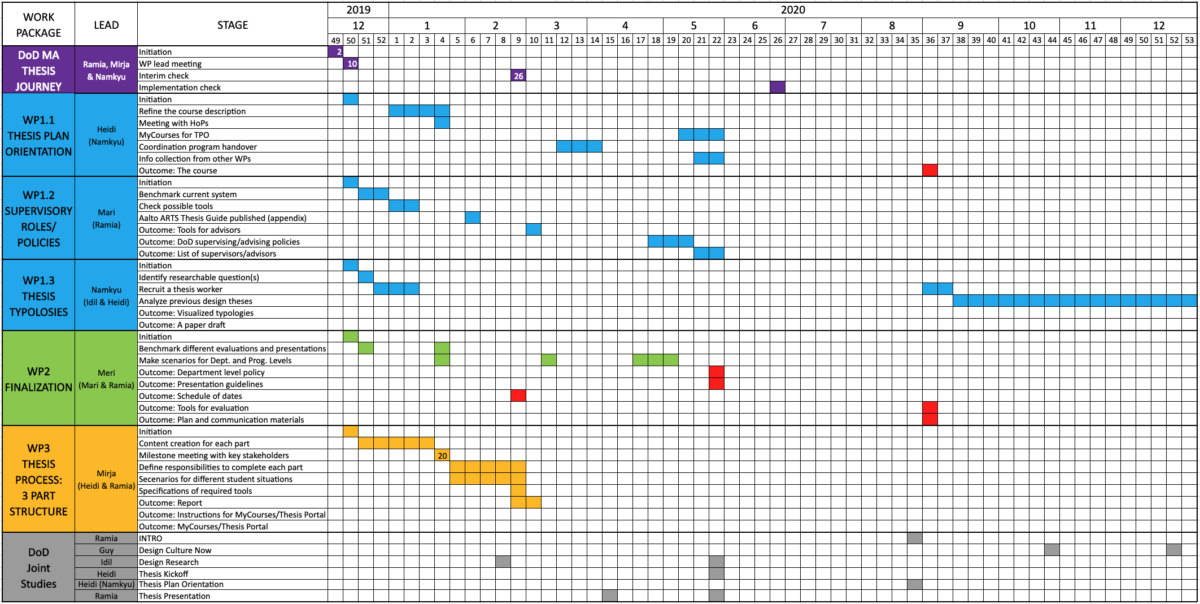
Figure 2. Development schedule of different work-packages. (click to enlarge)
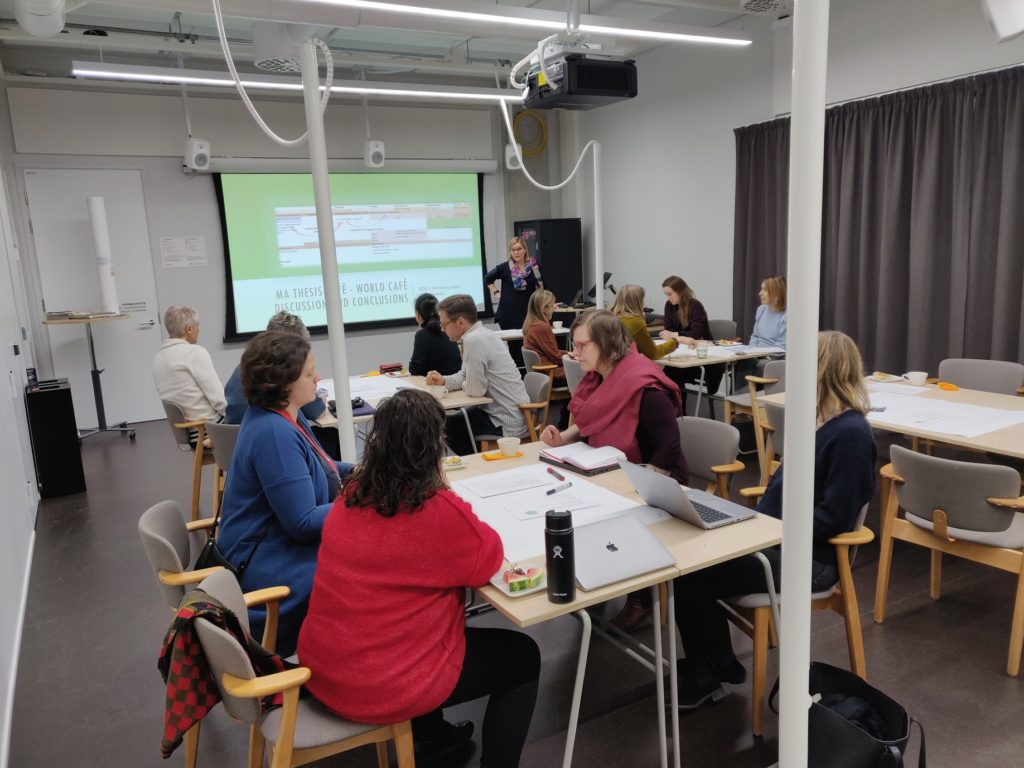
Figure 3. Learning Café, 20 January 2020. Photo: Namkyu Chun.
Key outcomes
As a result, outcomes of the project will include:
- Student Guide and Staff Guide;
- Stakeholder roles and policies (including clarified time allocation);
- Presentation and evaluation formats and scheduling;
- Annual clock with pathways to completion for students and ‘service paths’ for staff, and;
- Shared tool for tracking and distributing advisors and student milestones.
As one tangible outcome that is more closely linked to Aalto Online Learning, the development of ‘MA Thesis Portal’ is underway. The Portal is a go-to page utilizing Aalto’s MyCourses platform. This will help students self-assess their progress and find relevant information and resources, including Panopto video materials and Turnitin, according to their stage in the thesis process.
The Portal is structured and designed for a student-centered MA Thesis process.
It will provide clearer intended learning outcomes from the department level that are aligned to study programs and fundamentals of doing the Master’s thesis. Students can learn about both academic skills (including academic writing, presentation, referencing, etc.) and work skills (including remote work, time management, information retrieval, etc.) based on the appropriate stage of the thesis process.
To date (late April 2020), the first prototype of the Portal has been prototyped and feedback is being collected through multiple channels from teaching and service staff as well as students. The Portal is scheduled to be launched by late August 2020.
Team:
Ramia Mazé, Project Lead (Head of Education, Department of Design), Meri Arnala (Learning Services, Department of Design), Namkyu Chun (Postdoctoral Researcher and Project Manager phase 2, Department of Design), Mirja Niemelä (Project Manager phase 1, Department of Design), Heidi Paavilainen (Lecturer, Department of Design), Mari Partanen (Learning Services, Department of Design)
Special thanks to:
We’d like to thank Tomi Kauppinen and the Aalto Online Learning Team who helped initiate and support the project. The project would not be possible without the active student, staff and faculty participation from the department – thanks especially to participants in the Learning Café. The project is mostly funded from the departmental budget, we are grateful to Tuuli Mattelmäki for tangible support as well as expertise and to ARTS Vice Dean of Education Rasmus Vuori for his interest and advocacy. Lastly, Aalto Pedagogical Training team has contributed to this project indirectly via DigiDevelopment Studios.

